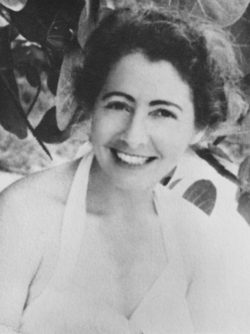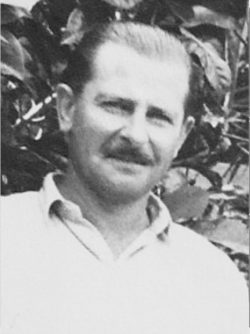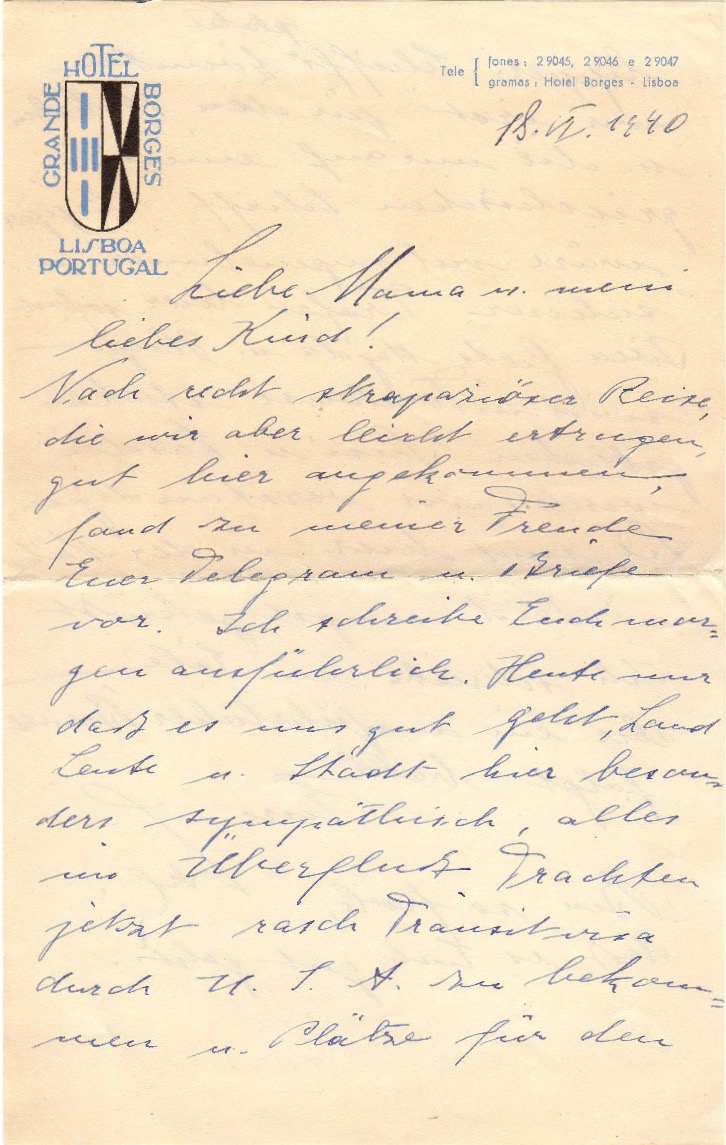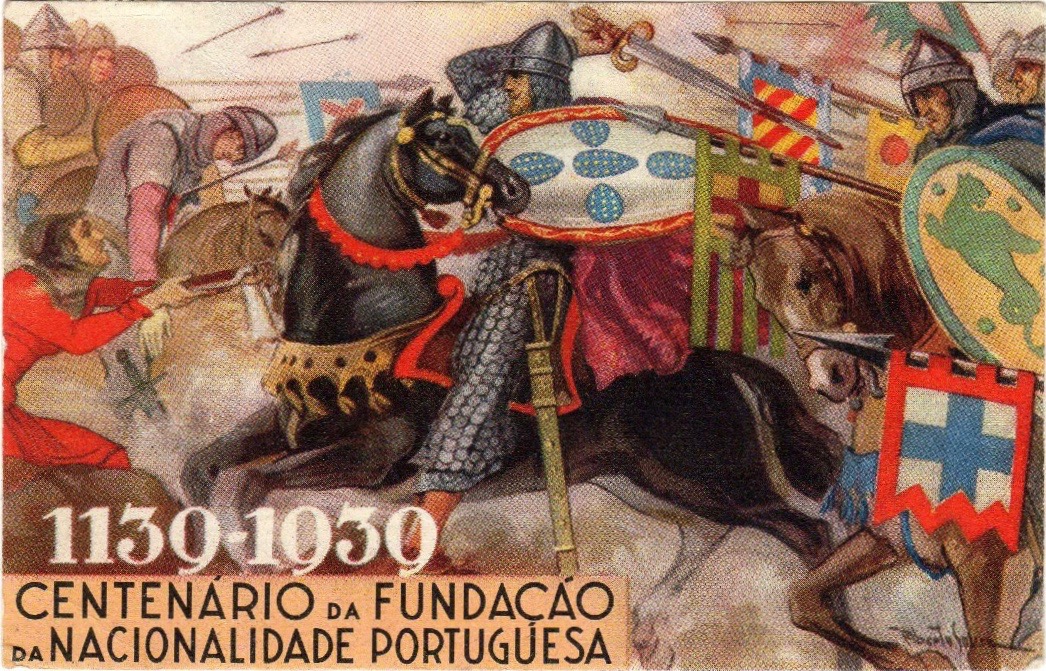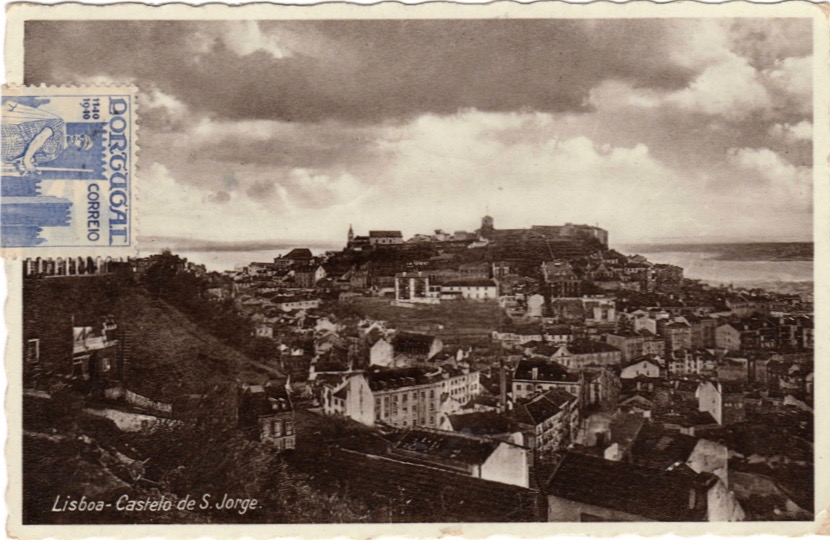Smolenski
Visa Recipients
- SMOLENSKI, Maria Theresa von, née LANDSBERGER P A T
Age 40 - SMOLENSKI, Otto Arthur von P A
Age 31
About the Family
The SMOLENSKI couple received Portuguese visas in Toulouse in July of 1940 from Emile Gissot, the honorary Portuguese consul, under instructions from Aristides de Sousa Mendes.
They crossed into Portugal, where they resided in Lisbon. They sailed on the vessel Quanza from Lisbon to Vera Cruz, Mexico in August of 1940. From there they traveled in June of 1941 to the Dominican Republic, where they remained.
- Photos
- Artifacts
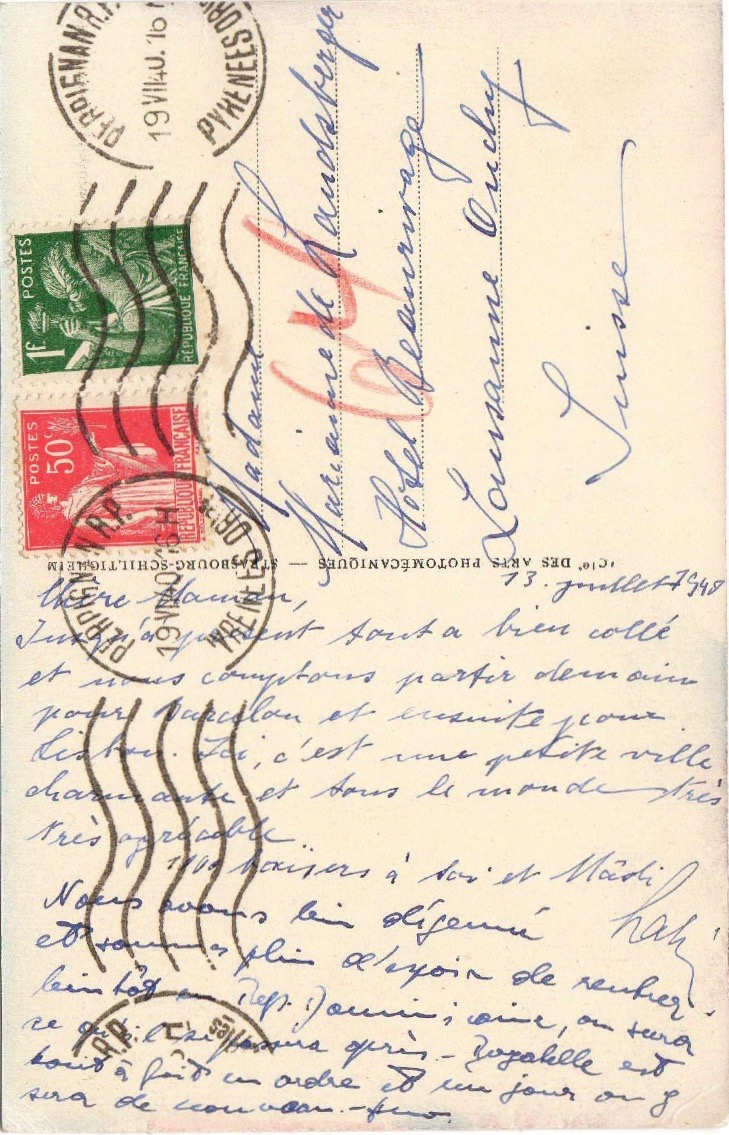
July 13, 1940 Maria Theresa and Otto SMOLENSKI postcard from Perpignan
Dear mother, So far everything has gone quite well and we are planning to leave for Barcelona tomorrow. Then onwards to Lisbon. The place we are now is a charming little town and everyone is very friendly. A 1000 kisses to you and Mädi*, Lali [Maria Theresa] We have eaten well and are hopeful about the arrangements for our journey to the Dominican Republic. Then we will know what will happen. We left Bagatelle* in good hands and will go back there one day, Smo. [Otto] *Mädi is the name of Lali’s daughter *Bagatelle is the name of Lali and Smo’s house in Dax
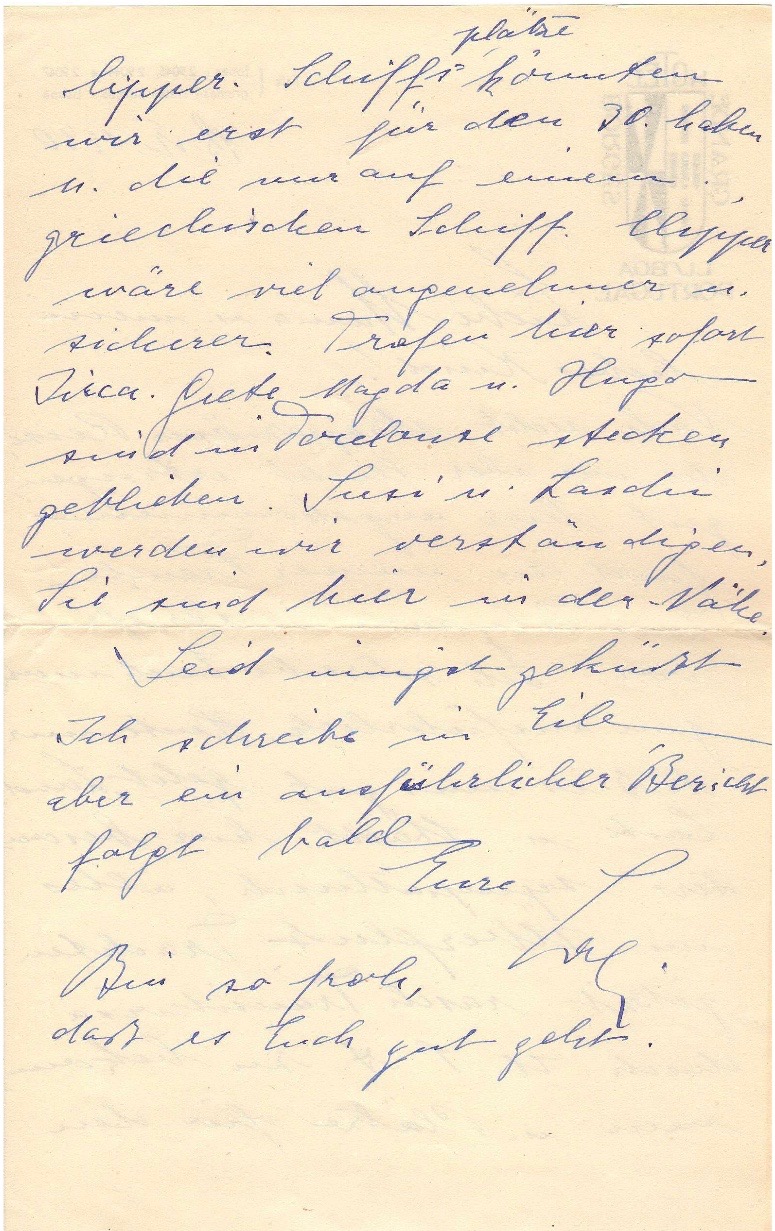
July 18, 1940 Maria Theresa SMOLENSKI letter about safe arrival in Lisbon, verso
Dear mother and my dear child, Our journey was quite strenuous but we managed to deal with it OK and have now arrived safely. I was so happy to find your telegram and letters. I will write to you properly tomorrow. Today just that we are well, and that we find the country, the people and the city very nice. There is an abundance of everything. We will now try to get our transit visas for the USA and tickets for the Clipper.* The first ticket we can get for a ship is on the 30th [of July] and that is on a Greek vessel [Nea Hellas]. The Clipper would be much more comfortable and safe. We ran into Jirca* straight away. Grete,* Magda* and Hugo* got held up in Toulouse. We will inform Susi* and Laschi,* as they are nearby. A big hug to both of you. I’m writing in a hurry but a more extensive letter will follow shortly. Your Lali (PS) I am so pleased that you are both well. Notes: *Lali dates her letter 18-VI-1940, but from the context it is clear that she means July, not June. *Clipper = Pan American seaplane. *Jirca = Dr. Georg Hitschmann, Lali’s cousin and ultimately a fellow passenger on the Quanza. *Grete and Magda = Markéta and Magdalena Landsberger, textile artists from Vienna, Austria, cousins of Lali. *Hugo = Hugo Müller, husband of Markéta Landsberger. * Susi and Laschi = visa recipients Zuzi and Leo Spitzer; Zuzi is yet another cousin of Lali.
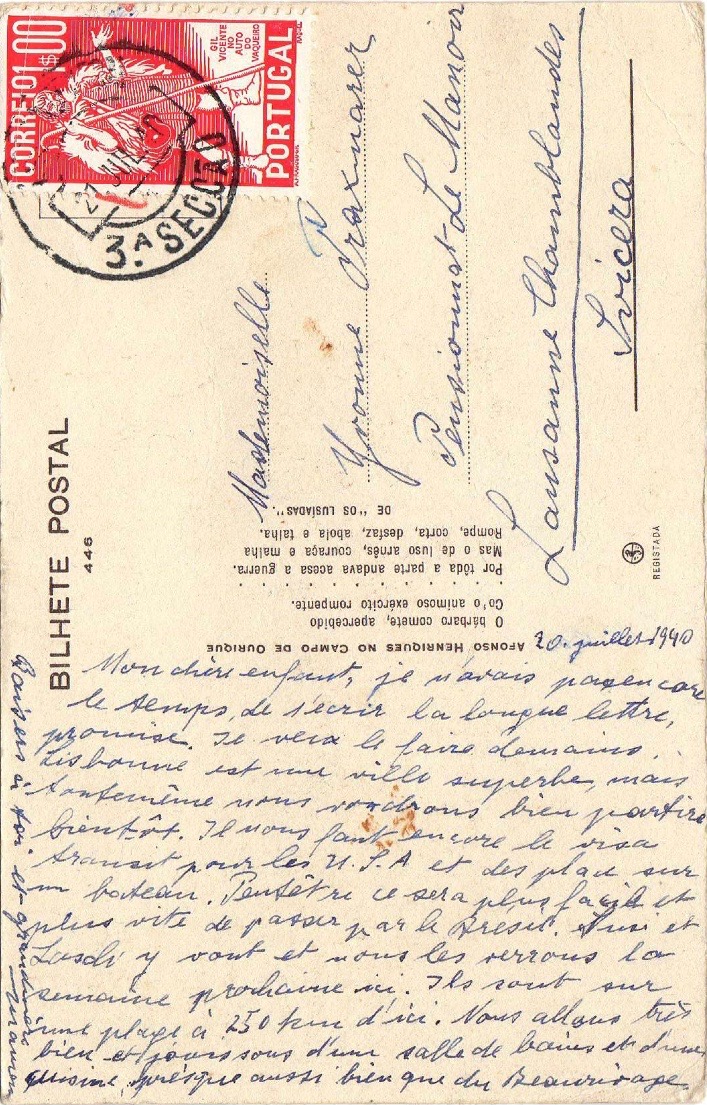
July 20, 1940 Maria Theresa SMOLENSKI postcard from Lisbon, verso
My dear child, I still haven’t had time to write the long letter I promised. I’m going to do it tomorrow. Lisbon is a lovely city but nevertheless we will be very happy to leave. We still need to get the transit visas for the USA and also tickets for a ship. Maybe it will be easier to travel via Brazil. Susi and Laschi* are planning to do that. We will see them here next week. They are now somewhere on the coast, 250 km from Lisbon. We are well, happy to have a bathroom and a kitchen, nearly as good as the one at Beaurivage.* Kisses to you and grandmother, Mother. *Susi and Laschi = Zuzi and Leo Spitzer. *Beaurivage = hotel in Lausanne, Switzerland where Lali’s mother Marianne Landsberger stayed part of WW II.
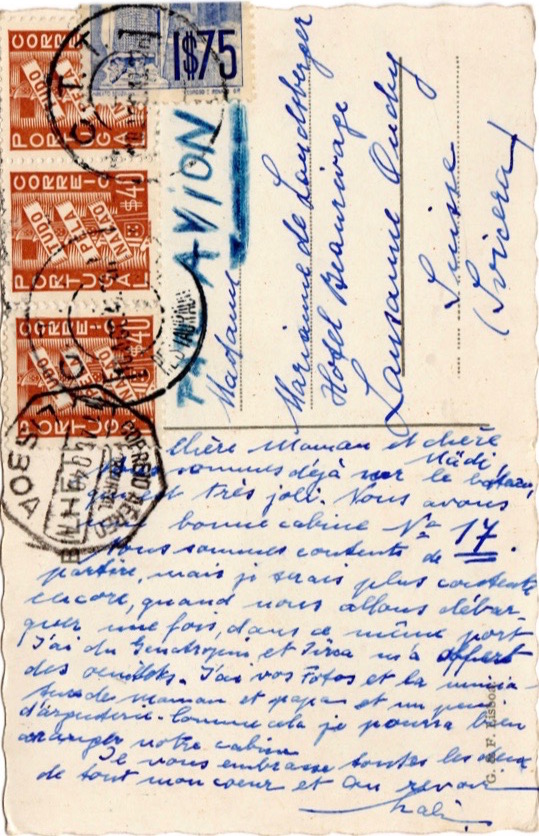
8 August 1940, Maria Theresa von Smolenski postcard from Lisbon aboard the Quanza, verso
Dear mother and dear Mädi, We are already on the ship, which is very pretty. We have a nice cabin, number 17. We are happy about leaving, but we will be happier still when we return to this same harbor. I have some (…..?) and Jirca* offered me some carnations. I have photos of you and the miniature painting of mother and father and some silverware. This will help us feel at home in our cabin. I embrace both of you with all my heart, and au revoir, Lali. * Jirca = fellow passenger Georg Hitschmann
- Testimonials
Testimonial of Maria Theresa von Smolenski née Landsberger
Translated from German to English by Sasha Meyer
Lisbon, July 21st, 1940
Dear mother and my dear child,
Today, Sunday afternoon I finally find the peace and quiet to write to you properly. You, mother, I thank for your sweet letter of the 16th. Mädi’s letter – with the copy of Robert’s letter concerning the firm – unfortunately did not reach us. I am however very relieved to hear that the business does not require her to return to Frydek. (The Landsbergers had a textile firm in Czechoslovakia which was expropriated by the Germans.) I understand that Mädi is going to stay in Lausanne for the time being. Hopefully the situation will not change and for the two of you it will be safe to continue living in Switzerland. What about the ‘’Arbeitsdienst’’ (labor service) I hear about? Would Mädi have to do that if she went back to Frydek?
Life here in Lisbon is so good that all the dreadful things we recently saw in France and Spain now almost seem like a very bad dream. It is as if all the trouble, deprivation and exertions of the journey were literally washed away when we had our first bath. Nevertheless I want to tell you about our trip because I know you will be interested. So:
Having obtained our documents in Pau, we managed to arrange a ‘’sauf conduit’’ (traveling permit) for Toulouse and Cerbère on the Spanish border. Also, with a lot of trouble, some petrol. Then we heard that foreigners to the area were forbidden to travel and would be incarcerated if they did. We asked at the Préfecture (town hall) and the gendarmerie (police station) and were told: ‘Hurry and leave!’’ It is what we would hear time and time again, also later when we left Toulouse – the rumor being that Pau and the entire Pyrenees region would be occupied as a compensation for the liberation of Paris. So we packed our bags and drove off.
The first road check outside Pau was strange but it did make us feel a little better. There were hardly any cars and they simply let us through. During the weeks before we had grown accustomed to seeing really heavy traffic – all kinds of vehicles, buses full of soldiers from Paris, lorries with marines, refugees in cars with trailers, suitcases and mattresses tied to the roof, people on bicycles and on foot – so the contrast was enormous and really quite eerie.
When we got to Toulouse the city turned out to be overfull. We looked for a hotel room for hours but did not find one, not even with the help of one of the very few taxis that still had some petrol and took us to places up to 12 km away. There was no depository at the railway station in Toulouse and we did not dare leave our luggage in the car. Fortunately the railway hotel allowed us to put our bags in the lounge. We ended up spending the night there together with 30 other people. It was really like a railway waiting room, with all those people and their luggage and crying babies. Towards midnight some drunken soldiers were removed with difficulty and that allowed us to grab hold of two empty lounge seats. I took the pillows off and put them on the floor so that we could stretch out. A lot of people followed our example, and we relaxed a little.
In the morning we washed in the railway lavatories, and in the pouring rain set off to the Portuguese Consulate. Standing outside we heard that a maximum of 5 people would be admitted in the morning. People who had been given illegal ["falsch"] visas at Bayonne had been refused at the border. For that reason all visas given out before July 1st were now declared invalid – so those poor people had to start the tiresome procedure all over again.
Thanks to the letter we had brought from our ‘’législation’’ (local authorities in St. Jean de Luz) we were allowed to pull a number for the following day. The Consul told me over the phone we should come to his office at 9 a.m. The following day the whole comedy started all over again. We stood outside. People who had been given a number for that day just got another one for the next – and by afternoon everyone was sent away.
At a certain stage I saw two men whom we had not noticed before leave the office building with passports and obviously visas. I wanted to follow them but I was so closed in by the crowds that I could not reach them. Finally Smo managed to give a policeman a warm handshake [a bribe]. That helped: we were admitted into the hallway and waited by the door of the office until 12 a.m. We were then told that the Consul would not see any more people that day. I asked the policeman to make an exception but of course he did not.
That night, our second in the hotel lobby, we slept on our raincoats and got up a little more rested. Early in the morning we went to the Consulate again, stood outside, and Smo repeated the trick with the handshake. We were allowed into the building, waited in the hallway and by midday got our visas. A friendly looking gentleman followed our method and was also successful. As he was planning to continue to Perpignan like us we decided to join forces and share the little petrol we had. We left our car in a garage and continued our trip in his. A taxi driver sold us 10 more liters of petrol – for a lot of money and many good words.
So off we went and left Toulouse. It was not until then that the gentleman told us that his ‘’sauf conduit’’ travel permit for Marseille had expired. Fortunately we passed all checkpoints without problems and arrived in Perpignan at 9:30 p.m. Here too all hotels had signs stating they were fully booked. Nevertheless our new friend managed to talk us into a nice little hotel and obtained no less than two rooms. We took a bath and I noticed that my body was covered in bug bites. The clean bed and a good meal made up for a lot – it really was a delight to have that hotel room. The following morning we went to the Spanish Consulate. What a difference… No crowds and everything well organized. By the end of the morning we had our visas for Spain and by the end of the afternoon the necessary exit visas. There was even time for me to buy a dress, shoes and a pair of trousers. In the evening we sat underneath some palm trees in a nice little café – and the following morning we boarded the train to Cerbère.
In Portbou on the Spanish border the check was really thorough. There was even a body check. Changing money and registering our luggage took so long that we nearly missed our train. With the help of our new traveling companion however we got there in time and obtained seats. That was lucky because the next train would not leave until 10:00 p.m. – eight hours later. Many of our fellow passengers had to wait for it.
As for the train – it had no compartments and all windows were open on both sides. The people there are probably used to that but for us it was tough. All three of us had a sore throat and a runny nose for days. The trip to Barcelona took many hours. The landscape was barren and we saw many demolished bridges and houses. We arrived at 9:00 p.m. and found rooms – filthy and expensive.
The following morning at 8:00 we took the train to Madrid – a 14 hour journey. It was a depressing trip – horrible food, everything smelling rancid, the coffee undrinkable and cigarettes obtainable with distribution cards only. The scenery was even bleaker and more desolate than on the way to Barcelona. There were many tunnels, and it was extremely hot. The windows could not be closed so we were constantly inhaling fumes and coal smoke. In the restaurant car we spoke to an elderly elegant looking Frenchman who has been living in Madrid for the past 14 years. He told us many useful things. He agrees that the situation now is an atrocity, but he was anti-Republican of course and blames the revolution. Now he is politically undecided. He says the price of sugar is 40 pesetas per kilo, coffee costs 120 pesetas. He has 6 children and had just taken the whole family to a seaside resort on the east coast.
The hotel rooms we found in Madrid were even more filthy and more expensive. As our next train did not leave until late in the evening we decided to have a look around the city. You can see that Madrid once was really beautiful. For the Prado we were too tired. What struck us was the masses of very skinny children in the streets. We saw them picking up and licking out discarded sugar packs from the cafés. People generally look badly dressed in clothes with a lot of stains. There were a few big cars with swastikas – horrible! Then in the cinema we saw a documentary on the Armistice of Compiègne. It made a big impression on us.
In the evening we were quite happy to be leaving Madrid. On the train we ran into several people from the earlier trip who unlike us had missed their connection at the border. Smo, our friend and I shared a train compartment and travelled comfortably. It was early morning when we arrived at the Portuguese border. A clean station with pretty Fayence tiles in the same colors as many of the houses we saw en route. The authorities were polite, both the Portuguese and the Spanish. Nevertheless we could not leave the station until 2:00 p.m., arrived in Lisbon at 7:00 p.m. and found rooms in this pleasant hotel. (Grand Hotel Borges.) The Avenida Palace Hotel where we tried before had no rooms available, but on the doorstep we did happen to run into the secretary of the Législation in St. Jean de Luz who had just arrived. He is here to see friends but was willing to make an appointment with us.
Here in Lisbon we said goodbye to our traveling companion. He is Polish and after finishing his studies in Vienna worked for an export firm in Belgium for 10 years. He has now been assigned a job in the Congo and will travel there on the 30th [of July]. The only thing he fears is the climate which is supposed to be very unhealthy. His adventurous escape started with him joining the Polish army in Angers. He left them after 3 days, in time, but he lost his passport. He managed to replace it with one he bought in Lourdes and then tried to board a ship for Casablanca at Bayonne. The ship however was not allowed to leave the harbor – so he ended up taking the same route as us. It is remarkable how much easier everything went from the moment we met and started traveling together. He helped us and we helped him – e.g. with money matters. At the Spanish border one could change a maximum of 500 francs – obviously not enough for the trip so he would have had to wait for a money transfer. Smo and I were happy to help him out with US dollars which we could change into pesetas.
Here in Lisbon everyone is surprised that we have managed to reach the city, moreover with our passports. Up to now, most foreigners have had to hand over their documents at the border. The authorities send the people to small provincial towns some of which are on the coast. There they have to wait for further instructions.
Our first disappointment here was at the American Consulate. Transit visas are not given out until the Dominican Republic informs the USA that we have their permission to land. When they do, the USA needs to instruct the Consulate to issue the visa. We sent a telegram to Virgilio (Virgilio Trujillo, brother of the Dominican President Rafael Trujillo) and hope he can speed things up. If that does not work we still have some other ideas up our sleeve.
Today we had a visit from the former chef d’équipe of the Portuguese equestrian team. (Lali and Smo were international show jumpers who represented Austria on many occasions.) He is a Colonel in one of the best regiments and comes from an old Portuguese family. This afternoon he will take us to a Corrida bullfight and the day after tomorrow he wants to show us his military barracks and horses. Without being asked he also gave us a letter of recommendation for when we report to the police tomorrow.
The Colonel advises us to stay in Portugal. He thinks the war will end soon, but we really feel we have to finish our business with Virgilio. In any case the Colonel thinks there is no need to rush. We have reserved seats on a ship that leaves Lisbon on August 29th. There is no earlier possibility. The Colonel is planning to introduce us to a gentleman who during the [First] World War volunteered in the regiment of Smo’s father. Smo met him only briefly, but he knows the family of the gentleman’s wife very well. In any case it is nice to know such people, and we appreciate the care we are surrounded with probably double because these are such strange times. The day after tomorrow we might go to a beach 12 km away from here.
I hope that Mädi enjoyed her excursion and that the rest of your holidays will be pleasant too. Please say hello to Leo N.
Yesterday we went to see that bullfight. I decided to go along because I was told that the bulls would not be killed and no horses were involved. It was indeed bloodless but I also thought it was quite boring and a bit like a comedy. Apparently the exhibition about the bullfights is worthwhile, but it was very hot and I do not really think that this is my kind of thing.
I am worried about Fred (Lali’s brother Alfred Landsberger) but I also believe there will soon be peace.
I kiss and embrace you both,
Your Lali
Lisbon, August 2nd, 1940
My dear, good child,
I was overjoyed with your long letter, so sweet and with such tenderness. I find it very hard to leave this continent, but at least I know that the two of you are, thank God, doing well. I’m also happy that you are now at last seeing people your own age, and that you are enjoying that. It’s a relief to me too that you and grandmother are together. I pray that things will stay this way.
We will manage somehow, I’m quite convinced about that. Thank God last winter Smo sorted out our financial situation. As well as he could, anyway…. There are still a few things not quite right. If Konrad had not been so stubborn it would all be OK now. (Dr Konrad was a Swiss lawyer and financial advisor.) It’s a good thing we left La Bagatelle because otherwise we would now be in the same situation as the Lonna’s who can not touch their money - their bank accounts are blocked. (People who decided to stay in occupied France, like Lali’s aunt and uncle the Lonna’s were now in severe money problems.) Our accounts are also blocked, but that should be rectified shortly.
As for our transit visas for the USA – Virgilio’s answer was unclear so we sent him another telegram. To that he replied that we should get on a Spanish ship to Cuba and travel to the Dominican Republic from there. For several reasons we do not want to do that, especially not while we hold these temporary (Dominican) passports which are only valid for the one trip over. It’s too much of a risk as we now find that Virgilio does not even succeed in getting us transit visas for the USA – so how can he be expected to arrange anything when we get stuck.
A new development is that Hertha [Lorraine] and her friend arrived in Lisbon a couple of days ago. It appears to be our fate. Yesterday she managed to get transit visas for Mexico for us, and seats on a ship that leaves on August 8th. The big advantage is that this ship is stopping at New York. We could arrange for a banker to come and see us on board. Hertha suggested that we ask Dr Konrad to help us sort out our business in Santo Domingo – no cure no pay. She wants to involve another of her Dominican contacts too.
In any case we now plan to stay in Mexico until we are absolutely sure that we can travel to the Dominican Republic safely. If in that respect all fails we can find something to do in Mexico – of that I am sure.
So, my dear child, I’ll write to you again the coming days. I was really excited about your account of the excursion to the Gornergrat. (Mountain near Zermatt in Switzerland.) I could almost smell the icy air and see the flowers. I’m really pleased that you are now getting to know these mountains – a world I used to so love and enjoy. Climbing in that area with icepicks is a wonderful memory to me.
Please give my regards to everyone at the Pensionnat, including Miss Lavandey. (Mädi was staying at the Pensionat Manoir, a boarding house for girls in Lausanne.) I’ll write again before we leave.
Love and kisses,
Your Mami
PS Two linen dresses are being made for me, one yellow and one pink. Also a summerdress with bolero jacket, a white dress with little blue flowers, four more summer outfits and a light white linen coat. Surprising huh? All hand made for less than $ 100.
Lisbon, August 8th, 1940
Dear mother and my dear child,
It was very sweet of you to phone. I considered calling you several times – but I have to admit that I was afraid to do it. You will probably understand. In any case you were right to take the initiative, thank you. It was so nice to feel you close, even if it was only for a few minutes, and to hear your voices. Mother I forgot to tell you the most important. That you should write to me or send me a telegram if anything changes. If Mädi decides to go and live with her father after all, you might want to come and be with us. I hope you would. We could in that case try and organise a visa for you – maybe through the consulate in Geneva.
Should you need anything in the mean time, please contact Mr Santos at Cook’s. Say Hertha [Lorraine] told you to do so. He will do as asked. I also give you Colonel Albuquerque’s address: Rua Entre Campos 17, Lisbon.
If all should turn for the better, than I hope we will be back soon. If not, maybe we can visit. And if even that is not possible I think you, mother, should come and live with us – and Mädi could visit. I expect Mädi and also Papi would be allowed to travel. (Mädi’s father, Lali’s ex husband Rolf Praxmarer was not Jewish.) If only this war does not last long. Well, I don't expect it to.
I told you before to write to me at Vera Cruz. We now think we will continue to Mexico City straight away, so please write to us there instead: c/o Cook Company, Mexico City. Please give this address to Dr. Konrad too. The same address applies should he want to reach Hertha – she will be traveling with us. Don’t forget.
I’m sending you the boots I promenaded with yesterday. People thought they were awesome. A local shoe repairer managed to adapt them, which was also why they now look brand new. Three pair of gloves are also coming your way. The two large ones are for you, mother, and the smaller pair plus a blouse are for Mädi. Attached to the gloves are 3 lucky beetles. One of them is for Papi (Rolf Praxmarer) – also the little charm in the shape of a ship. I would have loved to send you more but I’m afraid it would cause you problems.
We now have good recommendations for Mexico. Moreover the second secretary of our législation - the one who gave us the temporary permits for Pau and some other things – is also traveling with us to New York. He has very good connections in Mexico, should we want to stay there. He is not returning to France. I guess that about Santo Domingo we will get more information while on the ship. We know that one of our fellow passengers is a gentleman who is highly respected there and apparently he was already successful in officially organizing his own emigration.
About us you should not worry. I have ‘’Gena(?)tropfen’’ (a type of medicin for sea sickness) with me and we have been told this is the good season with quiet seas. So we should have a comfortable journey over. Even deckchairs on board are reserved for us. Mr and Mrs Popper who were in Versailles with the Lonna’s are also on our ship.
I ask you once more: please write to me often. May God protect you both. I embrace and kiss you,
your Lali
PS Mother I meant to ask you on the phone again but I didn’t because I was afraid I would start crying. I wanted to avoid that, because really I am confident that everything will be all right. Above all I believe we will see each other soon again.
About Fred (Lali’s brother Alfred Landsberger) I do worry. If Iza (Fred’s wife Iza Poznanska) cannot or will not travel with him to the USA he says he wants to stay in England. But who knows, maybe he will decide to follow and join us.
The ship is not leaving until tomorrow. Mädi will you please write to grandmother Praxmarer and Lotte that I meant to write to them. I didn’t because I wanted to spare them unpleasant stories. Please tell them that in a diplomatic way. Many kisses!
Testimonial of Sasha Meyer, granddaughter of Maria Theresa von Smolenski
Lali [Maria Theresa] and Smo [Otto] left their house in Dax, France, at the end of June 1940. They travelled by car first to Luchon in the Pyrenees and then on to Toulouse. There they spent several days trying to get to speak to the Portuguese consul. Eventually they managed to obtain visas which allowed them to travel to Lisbon. Their route would be via Perpignan where they left the car, and by train via Barcelona and Madrid on to Lisbon. It was a difficult journey as there were many roadblocks and particularly in France the authorities were unclear about what type of papers were needed to continue. Part of the way Lali and Smo travelled alongside Lali's cousins Magda and Marketa Landsberger. They were in separate cars. When the two sisters were held up in Toulouse because they didn't have the correct documents, Lali and Smo continued without them. From Lali's later letters it shows what a difficult decision it had been to leave her cousins behind. Magda and Marketa were indeed able to continue their journey two weeks later and after many more mishaps, eventually reached Brazil. Lali and Smo would never see them again.
In Lisbon, on August 9th, 1940, Lali and Smo boarded the Quanza. It was a relatively small Portuguese cargo ship with around 300 passengers on board -- mostly Jews from Central Europe heading for a new future. The trip to their first stop -- New York City -- lasted 13 days. Lali wrote a positive and really quite funny letter to her mother and daughter about the ship and the other passengers on board. It may well be that for the sake of her family she painted a rather more positive picture than was really called for, but there seems at least to have been enough food, and the passengers' company appears to have been pleasant.
Without a clear idea of where they were heading, Lali and Smo travelled on. There was still no definite answer from the Dominican Republic, and permits for Mexico, Cuba and Argentina were also pending. From New York City, the SS Quanza sailed to Vera Cruz. Lali and Smo, traveling on fake Dominican passports, were among the first 30 passengers who were allowed off the ship. Then, quite suddenly, the authorities stopped the disembarkation process. Among the passengers who were refused entry to Mexico was Lali's cousin Jirka Hitschmann. Lali writes about the way Smo and several other lawyers, both on the ship and in Mexico managed to convince the authorities that he and several others should be allowed to disembark. It was close -- Jirka was given entry only hours before the Quanza's departure. For the other passengers of the SS Quanza, with no place to go and confronted with the risk of having to return to Nazi Europe, the trip turned into a nightmare that was widely discussed in the international press. Eventually, thanks to the intervention of Mrs. Eleanor Roosevelt, the refugees were allowed to enter the US on an extra stop at Norfolk, Virginia. But that is another story... In Mexico, Lali and Smo were allowed to enter the country on temporary permits and had to spend nine frustrating months trying to arrange the paperwork. They rented a place in the Acapulco area, where they had friends. Lali, who otherwise in her letters is never negative or even outspoken, did not like the country. Although she speaks with warmth of the people she is in direct contact with, she hates the corruption, the guns and, at times, the heat and humidity.
On June 7th, 1941, just as Lali and Smo were resigning themselves to the idea of staying in Mexico and were making preparations to buy a small house in Acapulco, they were suddenly given the official go-ahead to move to the Dominican Republic. Preparing for the trip and saying goodbye to their friends and acquaintances all happened in a matter of days. On June 12th they left for Havana, Cuba, by ship. The journey lasted three days. After two days in Cuba the plan was to take a seven-hour flight to the Dominican Republic. An unexpected intermediate landing however resulted in an extra day in Port-au-Prince, Haïti.
Lali and Smo arrived in the Dominican Republic on June 20th, 1941. They were met at the airport by Don Virgilio Trujillo y Molina. He took Lali and Smo to his ranch outside Ciudad Trujillo and offered them lodgings in one of the buildings on his property. They stayed with him for several weeks. In the following years Lali would write repeatedly that Don Virgilio had been helpful in many ways and indispensable in getting them acquainted with their new surroundings.
This testimonial is excerpted from https://www.wikitree.com/wiki/Landsberger-5



